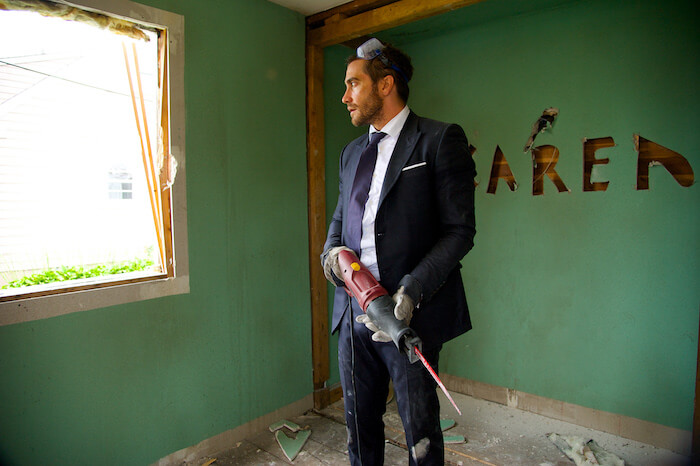Jean-Marc Vallée, Auteur? Demolition
 Demolition
Demolition
Directed by Jean-Marc Vallée
Opens April 8
Watching Jean-Marc Vallée’s last two films, Dallas Buyers Club and Wild, a year apart, I didn’t particularly think I was watching a director’s evolution, beyond the fact that the latter is a bit better than the former. They both feature awards-season comeback performances from leading actors who had been, to some degree, lost in the commercial wilderness; they both jump around a little in time; they both take their stories from real life; they both use plenty of indie-approved tasteful handheld. Some of that is also true of Demolition. Jake Gyllenhaal has yet to maintain a McConaughey-style losing streak or even a Witherspoon-style obligation to more commercial prospects, and the movie isn’t (as far as I know) based on a true story; otherwise, the pieces for another solid, unspectacular studio indie seem to be in place.
Yet during Demolition, I felt like I was seeing Vallée’s style, which I previously would have designed as somewhat negligible, reach a new summit. It’s not a question of absolutely top-shelf material, either. The story of Davis Mitchell (Gyllenhaal), a young financial go-getter who loses his wife Julia (Heather Lind) unexpectedly, finding himself stuck with her family (principally his father-in-law and boss, played by Chris Cooper) and his nagging understanding that he may not have loved her anymore actually resembles a previous Gyllenhaal movie, the 2002 drama Moonlight Mile, which pivots on a similar dynamic. The Demolition screenplay by Bryan Sipe is sharper and cleaner, but it’s also not quite so clever as it thinks it is, especially when it comes to its would-be offbeat sense of humor.
But for an hour or so, at least, Vallée makes it sing. He jumps in and out of flashbacks, driven by a series of letters that Davis writes to a vending machine company; while at the hospital learning of his wife’s death, a machine stymies his attempt to purchase M&Ms, which causes him to handwrite a complaint letter filled with personal details (a novelistic touch, though the movie is not adapted from anything). The letters are received by Karen (Naomi Watts), single mom to scrawny teenager Chris (Judah Lewis), and she takes an interest in Davis’s seemingly fragile well-being. The fragments—of Davis and Julia’s life together, of Davis wandering through a haze of grief that he realizes should be thicker and darker, of Davis’s newfound desire to take things apart and figure out how they work—form a rhythm so fast and assured that the movie doesn’t have time to wallow in any attendant cutesiness. What felt perfunctory and sometimes unsatisfying about Vallée’s earlier films here pulses with nervous energy. Gyllenhaal effectively plays against his puppyishness as a guy who’s not quite a boor, but sometimes seems like one in his inability to fake polite sensitivity. His weird, misshapen grief turns life into a series of banal mysteries, and he keeps looking around for clear, logical solutions.
Vallée obliges this jittery searching by tinkering with audience expectations. He repeatedly toggles between diegetic and non-diegetic sound with his pop soundtrack, most memorably in a stop-and-restart use of Heart’s “Crazy on You” (Virgin Suicides still owns it, but given that, Demolition makes a better play for it than I thought possible). He slips characters into view before formally introducing them. He allows Davis to look like kind of an asshole, without smugly reveling in his odd behavior.
Eventually, Vallée stops skipping around and ahead so much, and as Demolition becomes more linear, it loses some steam, turning into a more conventional story about a guy coming to terms with things, and also bonding with an outcast child, et cetera. This may indicate that the movie’s enthralling first hour-ish builds on a gimmick, rather than solid storytelling. But Vallée is onto something in that first stretch, something he hinted at when framing Wild: He conveys the matter-of-fact free association of memory, breaking Davis’s story into component parts. It’s hard not to feel slightly let down when the movie starts to rebuild itself.
You might also like 



















